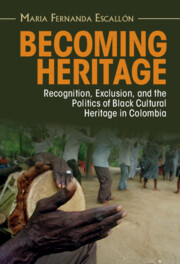Book contents
- Becoming Heritage
- Afro-Latin America
- Becoming Heritage
- Copyright page
- Dedication
- Contents
- Figures
- Preface
- Acknowledgments
- Abbreviations
- Introduction
- 1 A New Framework of Legitimacy
- 2 Institutionalizing Heritage
- 3 Heritage in the Face of Death
- 4 Palenqueras and the Trap of Visibility
- Epilogue
- Bibliography
- Index
4 - Palenqueras and the Trap of Visibility
Published online by Cambridge University Press: 06 April 2023
- Becoming Heritage
- Afro-Latin America
- Becoming Heritage
- Copyright page
- Dedication
- Contents
- Figures
- Preface
- Acknowledgments
- Abbreviations
- Introduction
- 1 A New Framework of Legitimacy
- 2 Institutionalizing Heritage
- 3 Heritage in the Face of Death
- 4 Palenqueras and the Trap of Visibility
- Epilogue
- Bibliography
- Index
Summary
This chapter examines how the double-edged quality of Palenque’s ICH declaration plays out in the politics of representation. I focus on the lived experience of Palenquero women who work as informal fruit vendors in Cartagena, and who for decades have been one of the most widely recognized images of Colombia’s tourism and heritage industries. I analyze a 2018 incident in which police in Cartagena attacked a well-known vendor named Angelina Cassini, confiscating her fruit stand and merchandise for allegedly illegal occupation of public space. As this incident underscores, Palenqueras’ national and international fame as touristic icons and representatives of UNESCO-recognized culture provides them with no protection for their work. In tracing the disconnect between Palenqueras’ public image and lived experience, I highlight the system that profits from Palenqueras’ visibility while erasing the difficulty and precarity of their lives as street vendors.
I connect this incident to a crucial flaw in Palenque’s heritage declaration: it has mostly resulted in safeguarding activities taking place in town. As such, even though Palenque has an ever-growing diaspora, most of the safeguarding projects and institutional attention surrounding heritage are tied to Palenque itself. Despite its intangible nature, ICH attaches to place, not people, and leaves Palenqueras anchored to a limited geo-ethnic imaginary that restricts rather than empowers them. In this example of heritage exclusion, the declaration that recognized Palenqueros’ cultural practices neglects its most emblematic icon.
- Type
- Chapter
- Information
- Becoming HeritageRecognition, Exclusion, and the Politics of Black Cultural Heritage in Colombia, pp. 141 - 182Publisher: Cambridge University PressPrint publication year: 2023



